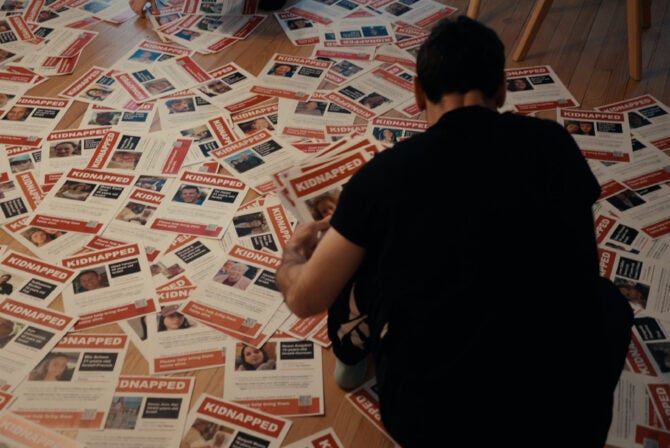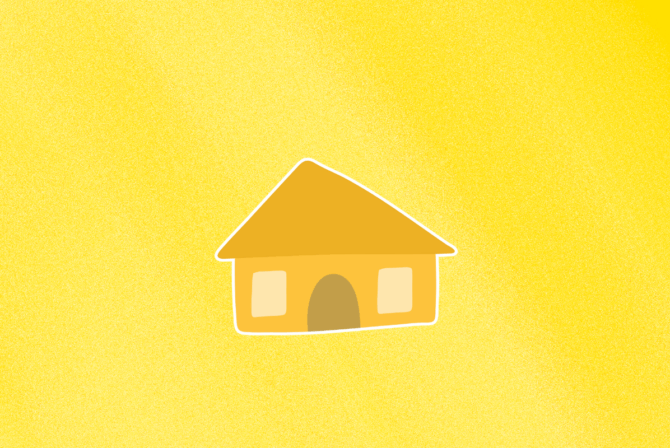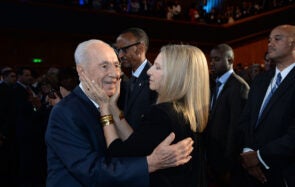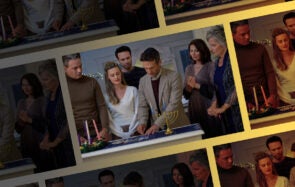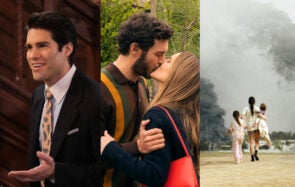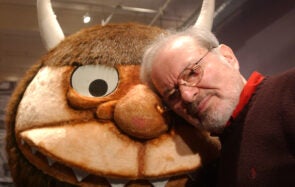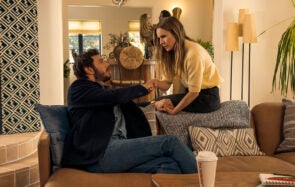Etgar Keret’s fiction has long been celebrated for its winning combination of humor, magic, and downright strangeness. So it was a genuine surprise when the 47-year-old Israeli writer aimed his quirky and cunning observations on real life for his latest book, a memoir titled, “The Seven Good Years.” Covering the—you guessed it—seven years between the birth of his son, now 9, and the death of his father, Keret touches on everything from terrorist attacks to playground showdowns to keeping a diverse family intact. He was kind enough to speak to me by phone from his Tel Aviv home.
I read that you wrote your first piece of non-fiction—the first essay in ‘The Seven Good Years’—on the day that your son was born. What do you think it was about becoming a father that inspired you to switch genres?
It’s funny—as a kid, I didn’t have very good coordination. I was a dreamy kid but very hyperactive, so every time I would run, I would fall and hurt myself. They would always have to take me to get stitches in my forehead. My father at the time had a kiosk at the swimming pool. So I kind of grew up in a swimming pool, and since the age of 2, I learned how to swim.
For me, there was always this kind of strange, safe feeling about water. When I’m in water, I can’t fall. I can’t bump my head against anything. I always say when I’m in water everything makes sense. I think I have the same kind of relationship between living and writing. With living, you know you can always fall and hit your head. But in writing, I feel less stressed and safer. I discovered both with the birth of my son and when my father became ill that some of those issues, it’s easier for me to reflect on them in writing.
In the book you write about a game you made up called “Pastrami Sandwich” to get Lev to lie down during his first air raid siren [“Mommy and I are slices of bread… and you’re a slice of pastrami, and we have to make a pastrami sandwich as fast as we can”]. Now that he’s a little older, do you still play that game or do you talk more openly with him about the realities of Israel?
READ: On Vacation In Israel in the Midst of a War
I must say that he’s older, but we still do Pastrami Sandwich in the mornings. I try to speak with him about almost everything openly. When you live in a place like Israel, the truth is even if I wanted to, I cannot block him out of life. I wouldn’t let him watch the news, because I find it very pornographic the way they show violence here, but we talk about the basic information: why is there a war between us and the Palestinians; what do the Palestinians want; what does our government want; what do people like me and his mother want; why do some processes fail. I really think that people tend to underestimate the understanding of children.
Has your son ever asked you a question that you had no idea how to answer?
I remember when he was 4, and I read a story to him about an old king who had died. He asked me, “Does everybody die?” and I said to him yes, and he said, “So for how long do you get to live?” And I said to him, “You know what, if you do enough sports and exercise and don’t smoke cigarettes, you can live up to 120 years.” And he stood up in his bed and he said, “This is not fair! It’s not enough! 120 years is not enough!” I think I have very strong intuitions and instincts, but when you’re in a situation like this, it’s not like I know what I’m supposed to do. Most of the time I don’t even know what I’m doing.
In the American Jewish community there’s a lot of talk about interfaith families, but reading about your own extended family, it made me realize how much variation there can be just within one Jewish family, as far as your sister becoming ultra-Orthodox and your brother leaving religion completely. Do you have any advice for families dealing with multiple levels of observance?
My family knew how to get along before becoming so diverse. I think in the end, it’s all an equation of how much you love and how much you’re willing to sacrifice to keep that love alive.
So many times you are in a situation where you say, “I wish my sister could read my books; why doesn’t she read my stories?” But I’m sure my sister says to herself, “Why does my brother drive a car on Shabbat?” At the bottom line, everybody in our family thinks that we are all too important to each other to just walk out.
READ: Mayim Bialik: Mourning My Father’s Death
Does your son ask questions about God?
My sister is very religious and my wife is an atheist, so when he was younger he said to me, “I think I finally figured it out. There is a god, but only in Jerusalem,” because that’s where my sister lives. I’m agnostic, and I openly say to him that I really believe that there is something out there—I don’t know what—but I really believe that there is something out there.
In the end he’ll make up his own mind, but he’s being raised in a very secular environment, and I would say he’s leaning more to the secular side.
In the book we get a glimpse of your feelings in the immediate aftermath of your father’s death. Now that some years have passed, what is it like to mourn your father? Has it gotten easier, harder, or just different?
I don’t think it drastically changes. I don’t think I miss him less now or more now. There’s always those moments when I wish he was around. At the same time, I recognize some of his traits in me.
I won’t say I feel like he’s watching me or something—it’s not that. But my father was a very unique person and in a sense, some of his strangeness is rubbed into all of us.
Do you often talk about your father with your son? Does he remember him?
I sometimes tell him funny stories about my father—my father had really good stories. And there are very rare times when he says that he misses him. When he was younger he said, “Will he ever come back?” and I said, “You know he’s dead,” and he said, “Yes, but you know, like in the zombie movies!”
My grandparents from my mother’s side died in the Holocaust; my grandfather from my father’s side was stabbed to death in a domestic war in Israel long before I was born. And the only grandmother I kind of knew died when I was 3 years old, so the concept of grandparents was something that never existed for me. But now, through my son, I can see how much you can get from a grandparent.
READ: Talking with Zach Braff, Kate Hudson & Mandy Patinkin of “Wish I Was Here”
One day we went to my parents’ house and they gave him some Pringles. I said to him, “Can I have one?” He’s very generous so he said yeah, but just as he was about to hand it to me, he kind of slowed down and said, “No, it would be unfair if I gave it to you. When your grandparents gave you Pringles, you never gave me any, so why should I give you any?”
So I said to him, “My grandparents never gave me Pringles. I can hardly remember them. They died before I was your age.”
He was quiet for a moment, and then he gave me the can of Pringles and said, “Here, Father, you can have them all. I just lost my appetite.”



